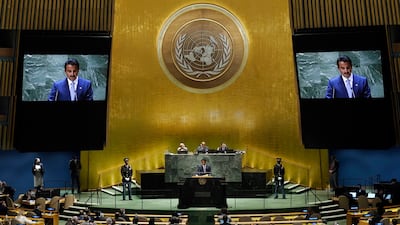Qatar wants to capitalise on the prisoner swap deal it mediated between the US and Iran by seeking to establish common ground between the nations regarding Tehran’s nuclear programme.
Russia’s war in Ukraine may have dominated discussions at the UN General Assembly so far, but Iran’s nuclear ambitions continue to worry the West.
Tehran has steadily enriched more uranium and supplied drones to Russia’s military.
A nuclear deal with Iran remains a distant prospect five years after former US president Donald Trump withdrew from a 2015 pact that eased sanctions in return for restrictions on Tehran's nuclear programme.
US President Joe Biden has faced Republican criticism for unfreezing $6 billion of Iran’s assets in the prisoner swap deal.
Qatar is pressing both sides to engage in more talks and reach an understandings, three regional sources said.
Such agreements would aim to slow Tehran’s uranium enrichment and ensure more international monitoring, as well as curbing the activities of Iran’s proxy militias in the region.
The deals would also seek to halt Iran’s drone exports. In return, some US sanctions on Iranian oil exports would be eased.
Officials in Doha said its delegates would hold separate meetings with Iranian and US officials at UNGA in New York this week.
One source said those meetings would include discussing uranium enrichment and Iranian drones.
The idea of further talks aims to prevent an escalation in tension rather than a nuclear agreement.
Qatar helped to forge the detainee deal with shuttle diplomacy between Iranian and US negotiators staying in separate hotels in Doha.
On Monday, when the detainee swap took place, US Secretary of State Antony Blinken left the door open to diplomacy on Iran's nuclear problems, which he described as “perhaps the number one issue of concern”.
Washington is "not engaged" in indirect talks with Iran "but we’ll see in the future if there are opportunities", he said.
Two Iranian sources said there would be indirect meetings between Tehran and Washington in New York that could pave the way for talks on a nuclear “understanding”.
They said Iran never shut the door to nuclear diplomacy.
“Considering the upcoming US elections, it is possible to reach an understanding that will involve issuing waivers on banking and oil sectors that would allow Iran to export its oil freely and get its money back via the banking system," another Iranian source said.
Currently, the practice is barred by sanctions.
On Sunday, when asked whether there would be indirect talks with Iran at the UN General Assembly, a senior US administration official said “absolutely not”.

